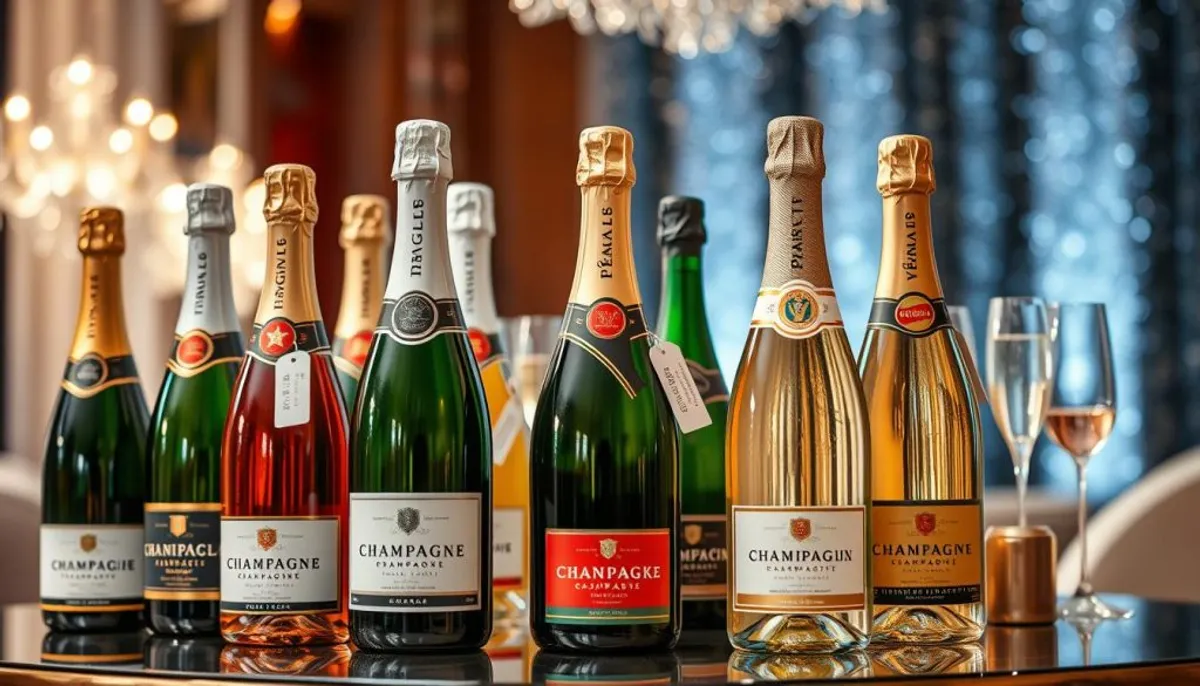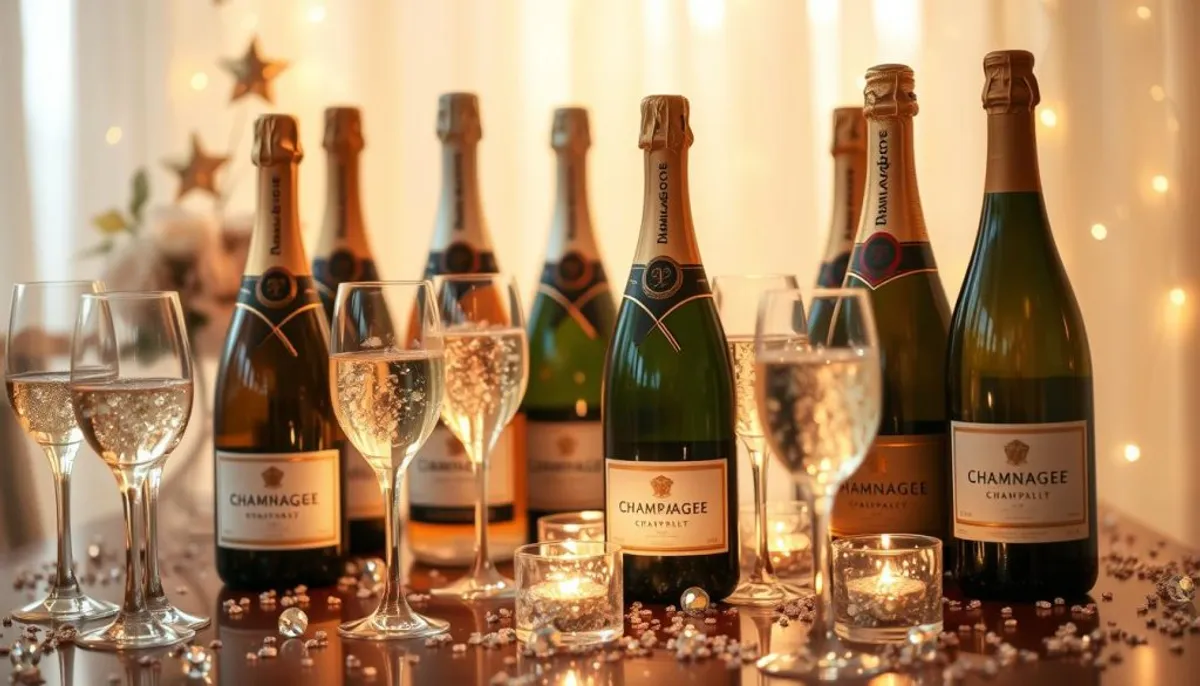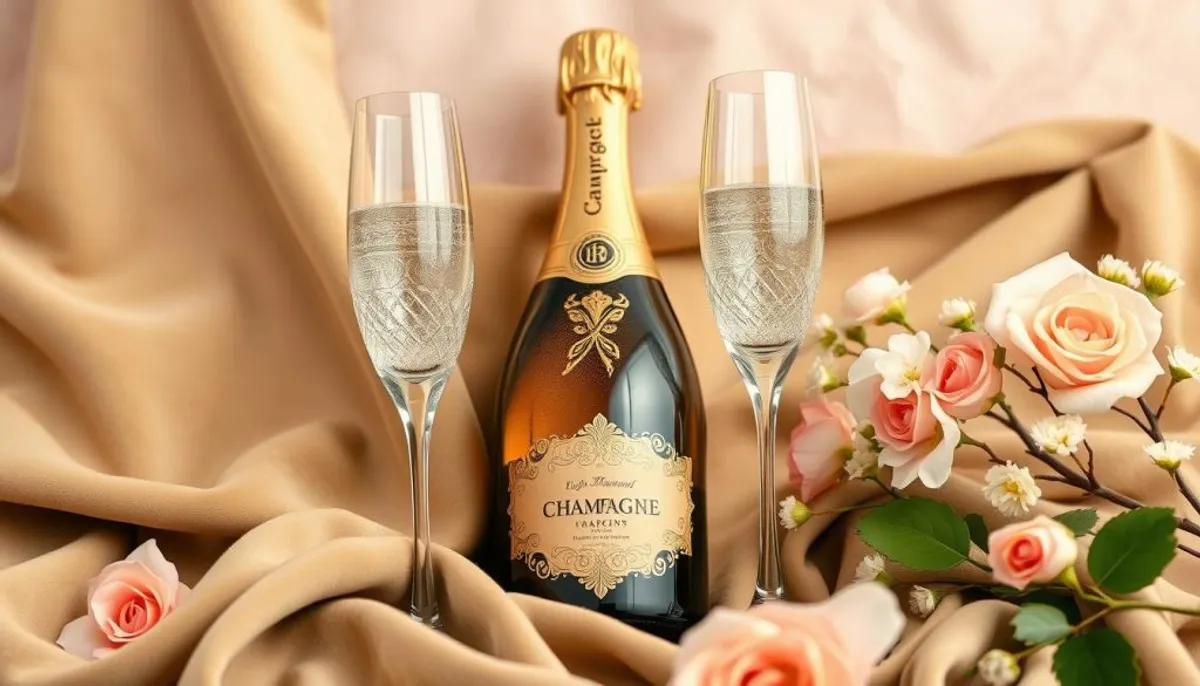Opening a bottle of champagne is a guaranteed way to enhance any event. Yet, finding the ideal champagne at a fair price can be daunting. Whether you seek affordable options or premium labels, grasping the nuances of champagne pricing is crucial for selecting the perfect bottle for your celebration.
The champagne market spans a broad spectrum, from entry-level to luxury vintages, catering to every financial capacity. Let’s explore the world of champagne, uncovering how to secure the finest deals without straining your budget.

Did you know that some of the most sought-after champagne brands offer selections under $10? These may not be authentic French Champagne, but they’re ideal for casual gatherings. In contrast, premium labels such as Dom Perignon can reach hundreds of dollars per bottle, reserved for those rare, memorable occasions.
Key Takeaways
- Champagne prices vary widely, from budget-friendly to luxury options
- True French Champagne tends to be pricier due to strict production methods
- Popular brands like La Marca and Barefoot offer affordable sparkling options
- Vintage champagnes from 2020 and 2023 are currently trending
- The most common bottle size is 750ml, but smaller options are available
- Always check age restrictions and shipping policies when buying online
- Proper storage can impact the value and quality of your champagne
Understanding Authentic Champagne: Origins and Production
Authentic champagne originates from the Champagne region of France. This locale’s climate and soil, rich in chalk, are ideal for grape cultivation. The cool climate and gentle slopes influence the flavors of Pinot Noir, Chardonnay, and Pinot Meunier grapes, essential in champagne production.
The Champagne Region of France
The Champagne region boasts a storied past, tracing back to the 1st century AD. Towns such as Reims, Épernay, and Ay are pivotal in champagne production. Each town imbues its unique character into the wine. The region’s cool climate necessitates a double fermentation process, resulting in champagne’s distinctive bubbles.
Traditional Production Methods
Champagne production adheres to rigorous standards. The traditional method involves a second fermentation within the bottle. This technique, refined by Dom Pérignon in 1693, is responsible for the wine’s effervescence. Adolphe Jacquesson later introduced the wire cage to secure corks, enhancing storage and transportation safety.
Legal Requirements for True Champagne
Only sparkling wine from the Champagne region can be labeled as Champagne. This regulation safeguards the drink’s authenticity. True Champagne must adhere to specific grape varieties and aging requirements. These stringent standards guarantee that every authentic champagne bottle meets elevated quality benchmarks.
| Champagne Type | Sugar Content | Typical Price Range |
|---|---|---|
| Brut Nature | Less than 3g/L | $30-$60 |
| Négociant | Varies | $50-$60 |
| Grower | Varies | $30-$60 |
| Premium | Varies | Above $60 |
Champagne Bottle Price: Understanding Market Ranges
The champagne market spans a broad spectrum, accommodating various financial capacities and celebratory events. From the more accessible entry-level champagnes to the opulent luxury varieties, there exists a selection to suit every palate and budget.
Entry-Level Champagne Prices
Entry-level champagnes generally fall within the $50 bracket. These bottles represent a cost-effective entry into the world of champagne, allowing for indulgence without financial strain. Alternatives such as Crémant d’Alsace and Cava further enhance the affordability, delivering high-quality options at even lower price points.
Premium and Luxury Segments
Premium champagnes, priced between $50 and $100, showcase enhanced quality and complexity. The luxury segment, with prices exceeding $100, caters to aficionados and those marking significant events. These premium offerings often include extended aging periods and the use of superior grape varieties.
Factors Affecting Price Variations
Multiple elements contribute to the pricing disparities in champagnes:
- Grape cost and quality
- Production methods
- Aging time
- Brand reputation
- Marketing expenses
| Expense Category | Percentage of Cost |
|---|---|
| Grapes, production, processing | 24.8% |
| Vinification | 9% |
| Marketing | 15.2% |
| Distributor’s margin | 23% |
| Value-added tax (VAT) | 16.7% |
Grasping these factors elucidates the extensive range of champagne prices, from the budget-friendly entry-level varieties to the exclusive luxury champagnes and the exquisite european sparkling wines.
Best Value Champagnes Under $50
Discovering affordable champagne doesn’t require compromising on quality. We’ve identified some of the finest champagnes under $50, ideal for those desiring a luxurious experience without financial strain.

Paul Laurent Brut Selection
Paul Laurent Brut, hailing from Bethon, south of Epernay, stands out at $44. It presents delightful orange peel and herb aromas. With a harmonious mix of Chardonnay, Pinot Noir, and Pinot Meunier, it offers a rich flavor profile that exceeds its price.
Pierre Gimmonet Options
Pierre Gimmonet champagnes are renowned for their quality-to-price ratio. While full bottles are priced at $59.99, their half bottles offer significant value for those on a budget. These champagnes feature elegant white flower, toast, and lemon notes, making them ideal for special events.
Piper-Heidsieck Brut Offerings
Founded in 1785, Piper-Heidsieck consistently provides high-quality champagne at competitive prices. Led by Émilien Botillat, the youngest Chef de Cave in Champagne, this house prioritizes social and environmental responsibility. Their Brut offerings showcase green fruit flavors and subtle minerality, often available for under $50.
| Champagne | Price | Notable Features |
|---|---|---|
| Paul Laurent Brut | $44 | Orange peel and herb aromas |
| Pierre Gimmonet (Half Bottle) | Under $50 | White flower, toast, and lemon notes |
| Piper-Heidsieck Brut | Varies (Often under $50) | Green fruit flavors, subtle minerality |
These champagnes exemplify outstanding value, proving that quality bubbly can be enjoyed without overspending. Whether celebrating a special occasion or simply savoring life’s pleasures, these affordable champagnes offer a taste of luxury at a reasonable price.
Premium Champagne Selections ($50-$200)
Premium champagne embodies luxury and refined taste, offering 47 selections within the $50 to $200 range. This array caters to wine aficionados, providing enhanced quality and complexity. Ideal for special events or as exquisite champagne gift ideas, these bottles stand out, including the exceptional champagne elemart robion vb03.
Veuve Clicquot, a celebrated name in the champagne world, offers a variety of premium options. Their Brut Yellow Label, available in different sizes, ranges from $60 to $90 for a standard 750ml bottle. For those desiring a higher tier, the Veuve Clicquot Vintage Brut 2012 is priced between $90 and $110.
Mid-range champagne enthusiasts will find the Billecart Salmon Brut Reserve appealing. Priced at $99 for a 750ml bottle, it’s an ideal choice for celebrations. For a touch of pink elegance, the Veuve Clicquot Rose Champagne is also available at $99.
| Champagne | Size | Price Range |
|---|---|---|
| Veuve Clicquot Brut Yellow Label | 750ml | $60 – $90 |
| Veuve Clicquot Vintage Brut 2012 | 750ml | $90 – $110 |
| Billecart Salmon Brut Reserve | 750ml | $99 |
| Veuve Clicquot Rose | 750ml | $99 |
These premium champagnes offer exceptional value, blending prestige with affordability. Whether celebrating a milestone or simply enjoying life’s finer moments, these selections promise to enhance any occasion.
Vintage vs Non-Vintage Champagne Pricing
The champagne market is divided into two main categories: vintage and non-vintage. Grasping the distinctions between these categories is crucial for making wise choices when buying or investing in champagne.
Understanding Vintage Classifications
Vintage champagne is crafted from grapes picked in a single, outstanding year. These bottles generally command a 45% premium over non-vintage varieties. The year 2008 is notable, rivaling the excellence of 1988 and marking the finest since 1996. In contrast, non-vintage champagne combines grapes from various years to ensure consistent taste and quality.
Investment Value of Vintage Bottles
Vintage champagne presents a compelling investment opportunity. Its rarity, due to limited production and extended aging, drives price fluctuations. Unlike non-vintage champagne, which is best enjoyed within 36-48 months, vintage varieties can be aged for 5-10 years or more, often enhancing with time.
For those considering champagne as an investment, here are some key points:
- Vintage champagne prices begin around £40-£60 but can escalate to hundreds per bottle
- Notable vintage years in the 2000s include 2018, 2012, 2008, and 2002
- The UK, accounting for 23% of all champagne exports, is the largest importer
Whether you’re a casual consumer or a dedicated investor, recognizing the differences between vintage and non-vintage champagne can elevate your appreciation and direct your purchasing choices.
Special Occasions and Gift Sets
Champagne gift sets are the epitome of celebration. They transform any event, from weddings to graduations, into a memorable occasion. GiftTree provides a variety of options, catering to diverse tastes and budgets.
Luxury gift baskets combine premium champagnes with exquisite gourmet treats. Brands like Dom Perignon and Veuve Clicquot are paired with artisanal chocolates and savory snacks. To add a personal touch, consider custom engravings on crystal flutes or wooden crates.

Corporate clients value the meticulous attention in these champagne gifts. They are perfect for client appreciation or employee recognition, thanks to logo imprinting and bulk ordering. For those last-minute gifting needs, same-day delivery is available in select cities.
| Gift Set Features | Details |
|---|---|
| Champagne Brands | Gosset Grande Reserve, Duval Leroy Brut Reserve |
| Accompaniments | Chocolates, cheese, charcuterie, glassware |
| Customization | Personalized engravings, logo imprinting |
| Delivery Time | 2-5 days, same-day options available |
For an added touch of drama, consider a champagne saber. This accessory turns the act of opening a bottle into a memorable spectacle. It’s ideal for milestone birthdays or New Year’s Eve celebrations.
Purchasing Guidelines and Requirements
Understanding the champagne purchasing rules is essential. These regulations are in place to promote responsible consumption and proper handling of this luxurious beverage.
Age Restrictions and Regulations
In the United States, the legal age to purchase champagne is 21. This applies to both in-store and online transactions. For online orders, a legal adult must sign for the delivery. If this is inconvenient, consider shipping to a business address.
Shipping Considerations
Champagne shipping demands special attention. The title of the order transfers to the customer upon pickup by the carrier. Be prepared for the possibility of leakage during transit. Weather-related damages are not the seller’s liability. Some retailers offer temperature-controlled shipping to safeguard your purchase.
Return Policies
Champagne returns can be complex. Most sellers do not offer refunds on alcohol once it has been shipped. A 10% cancellation fee may be incurred if you change your mind before shipping. Always review the return policy of your chosen retailer before making a purchase.
| Policy | Details |
|---|---|
| Age Requirement | 21 years or older |
| Signature Required | Yes, by someone 21+ |
| Refunds | Generally not available after shipping |
| Cancellation Fee | 10% may apply |
By familiarizing yourself with these guidelines, you can ensure a seamless champagne purchasing experience. Remember to drink responsibly and enjoy your champagne!
Storage and Handling Impact on Value
Proper champagne storage is essential for maintaining its value. The right conditions can enhance aging potential and preserve the wine’s quality. We will examine the critical factors in champagne temperature control and storage methods.
Temperature Control Requirements
Temperature control is crucial for champagne quality. The ideal storage temperature is between 12-14°C (53.6-57.2°F). For short-term storage, up to 3-5 days, keep it at 40-50°F (4-10°C). For long-term storage, a consistent 55°F (13°C) with minimal temperature fluctuations is necessary.
Proper Storage Methods
To ensure optimal champagne storage, maintain humidity levels between 60-70%. This range keeps corks moist, preventing them from drying out and compromising the wine. Store bottles horizontally in a dark place to protect them from light exposure.
| Storage Type | Temperature | Humidity | Duration |
|---|---|---|---|
| Short-term | 40-50°F (4-10°C) | 70% | Up to 3-5 days |
| Long-term | 55°F (13°C) | 60-70% | Years |
Proper storage can significantly impact champagne’s value. For instance, six magnum bottles of Veuve Clicquot Brut 1949, stored under optimal conditions, sold for US $9,200 each. This shows how careful storage can lead to impressive returns for collectors and enthusiasts.
Conclusion
Exploring the realm of champagne can be an exhilarating journey, thanks to our comprehensive buying guide. It spans from entry-level options at £14.99 to premium selections at £54.99, catering to every financial preference. Our detailed review of 12 distinct champagnes highlights their unique characteristics, aiding in your selection process.
When delving into champagne selection, consider star ratings, which span from 3.5 to 5 out of 5. All bottles reviewed are 75cl, boasting an average 12.5% ABV. For those in pursuit of the finest champagne deals, be on the lookout for offers from various retailers. These retailers carry an array of exquisite selections.
Understanding the winemaking process enriches your champagne experience. It encompasses grape varieties such as Chardonnay, Pinot Noir, and Pinot Meunier, alongside aging periods ranging from 6 months to 10 years. Each step is crucial in shaping the final product. Whether you lean towards a low dosage or a VinePair top 50 ranked bottle, our guide encompasses it all. Enjoy your champagne journey!
RelatedRelated articles



